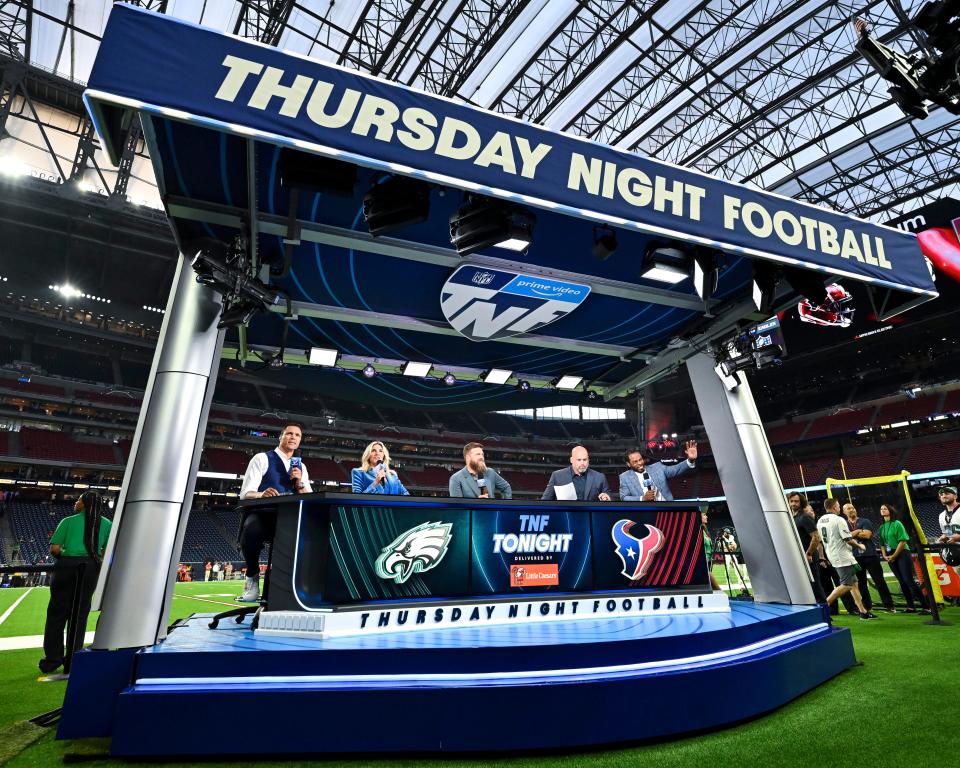NFL's 'Thursday Night Football' flex puts business partner ahead of fans in the stands
EAGAN, Minn. – Once again, the NFL flexed its mighty muscle when team owners voted in a measure on Monday that allows for the potential of flexing late-season games on Thursday nights.
The debate was so worthy that the matter was tabled the last time owners met, when New York Giants owner John Mara maintained that the proposal was “abusive” for fans because games could be switched with two weeks’ notice – a major inconvenience for fans who might have planned extensively to travel from out of town to attend the game.
Well, the NFL listened. The revised proposal, which passed by a 24-8 vote, now allows that Thursday night games, streamed on Amazon, can be flexed if there are at least 28 days before the fact.
“I stand by my comments from earlier,” Mara told USA TODAY Sports after the vote.
The switch to a 28-day window?
“It still shows no consideration for the fans,” Mara said.
Don’t expect the NFL to completely blow up the primetime schedules in Weeks 13-17. With flexible schedule already in effect for Sunday Night Football on NBC, the league points out that it has averaged fewer than two flexed games per year.

Still, with a green light to flip the primetime games – and ESPN’s "Monday Night Football" games are subject to being flexed, too, for the first time – this could get very interesting as the league has built in a mechanism to allow undesirable late-season games to be replaced by more attractive matchups that could generate better ratings.
And make no mistake: This is a major business-partner move for the NFL, which has a serious interest in seeing an operation that pays it more than $1 billion per year have a smashing success with its "Thursday Night Football" programming.
Then again, if a Week 15 matchup pitting two division leaders trying to clinch playoff berths replaces a game with a pair of 1-12 teams (one of whom lost its marquee quarterback in Week 2 to a torn ACL), why not make the switch?
It’s as much of a philosophical question for the NFL as it is a logistical conundrum.
“If you have a Raiders-Chargers game in Las Vegas scheduled for a Thursday,” Las Vegas Raiders owner Mark Davis told USA TODAY Sports, “and all of the fans driving from Los Angeles – the Raiders fans and all three Chargers fans – buy their tickets and book their hotels, how in the hell do you schedule it and now say, ‘Sorry, it’s now on Sunday?’ How in the hell do you do that?”
While allowing that the fans in the stands – especially those visiting from out of town – could be forced to make adjustments, Dallas Cowboys owner Jerry Jones pointed to fans in a larger context.
“Every owner in that room lives and breathes sensitivity to his fans,” Jones said. “And he knows how important each and every one of them are.
“But only 7% of our fans have ever been inside a stadium. Seven percent. So, we’ve got a lot of fans – a huge majority of fans that are out there – and this is good for them.”
Davis recognizes that the NFL, which last year began a 10-year package with Amazon, has a vested interest in the growth of the audience consuming games on the streaming platform. Yet it’s an old-school vs. new-school type of dilemma when it involves flexing the games.
The NFL makes it clear with this move, as if you needed to be reminded: The television audience is much more valuable than the in-stadium crowd. Yes, even with the merchandise, hot dogs and overpriced beer and parking attached to the in-stadium experience, the NFL is a TV sport.
And hey, in another generation as viewing habits evolve with the masses, the rights fees paid by streaming platforms like Amazon could dwarf whatever the networks or cable stadiums might offer. In one sense, the NFL is effectively investing on the ground floor of a growth industry.
“The NFL wants streaming to be successful and successful on Thursday night,” said Jones, who has long been one of the key power brokers among NFL owners when shaping broadcast deals.
Remember, Jones was a driving force when the NFL changed its model in 1994 to accommodate the fledging Fox network’s entry into being a major sports carrier – and in turn to become a major network.
“Every time we’ve made innovative but different ways, we’ve done that to show the games, then we’ve done some things that would help it out,” Jones said. “When Mr. (Rupert) Murdoch came, we did everything we could to help that out as good as we possibly can. This should show our fans and certainly the media industry that we’re going to do everything we can to make streaming on Thursday nights successful.”
This article originally appeared on USA TODAY: 'Thursday Night Football' flex benefits Amazon, not fans in stands

